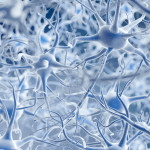 Parkinson(’s) disease is a very common, progressive neurologic disorder that results from degeneration of an area of the brain (the substania nigra) which produces a specific chemical called dopamine. The resulting dopamine deficiency leads to a classic pattern of movement (tremor/dexterity loss, decreased arm swing, disturbed gait, decreased facial expression), fatigue/sleep (REM abnormalities), autonomic (constipation, sweat changes, seborrheic dermatitis), emotional (depression/apathy) and cognitive (slowed thinking) dysfunctions. Conventional/Western treatment can help slow, but not stop the progression.
Parkinson(’s) disease is a very common, progressive neurologic disorder that results from degeneration of an area of the brain (the substania nigra) which produces a specific chemical called dopamine. The resulting dopamine deficiency leads to a classic pattern of movement (tremor/dexterity loss, decreased arm swing, disturbed gait, decreased facial expression), fatigue/sleep (REM abnormalities), autonomic (constipation, sweat changes, seborrheic dermatitis), emotional (depression/apathy) and cognitive (slowed thinking) dysfunctions. Conventional/Western treatment can help slow, but not stop the progression.
There is no test for Parkinson disease; the diagnosis is made by symptom evaluation, usually including resting tremor, rigidity and slowed gait. Typically, brain imaging is unremarkable.
Western medications levodopa/carbidopa have been used for years to address this condition, and generally provide adequate motor control for 4 to 6 years. Other medications (MAO-B inhibitors, dopamine agonists) may be added early or late in the disease. Some medications that block choline may help with tremor. Problems, such as constipation or fatigue/depression, are treated as they arise. Exercise/physiotherapy may help preserve functional independence. A surgically implanted deep brain stimulator can interfere with/dampen the (abnormally) hyperactive active area of the brain producing the excessive movements (tremor) or muscular contractions (rigidity). While not without significant risk, patients with these devices may require less medication or experience less depression. [1]
Traditional Chinese medicine (TCM) intervention for Parkinson’s manifestations is always complementary to Western Medicine treatment plans. In TCM, Parkinson’s starts as “Liver Wind” and “Yin” (substance) deficiency, along with other imbalances and deficiencies, including “Phlegm in the Heart Orifice (CNS)”. There is a “false excess” of Yang (excess movement/muscle tonicity) due to “deficient Yin not controlling/balancing Yang”. Interestingly, in TCM, autonomic disorders share a similar underlying pattern; Parkinson’s is strongly associated with autonomic dysfunctions of various kinds.
Neurological Scalp Acupuncture can dramatically help manage symptoms [4], especially tremor, rigidity, and shuffling gait. These improvements, if realized, are temporary and require repetition, but may improve quality of life and/or functioning. Body acupuncture and, more importantly, Chinese Herbal Medicine for addressing the “Phlegm” and “Yin deficiency” components can ameliorate the “Yin imbalance” underlying autonomic and emotional complaints. [2] [3] [4]
Neurological Conditions Testimonials
Learn more about Parkinson Disease
X
These brief overviews of conditions represent distillations of basic and current medical reviews from the following sources:
[1] Conventional Medical Sources
“Harrison’s Principles of Internal Medicine: Volumes 1 and 2, 18th Edition”. Dan Longo Anthony Fauci, Dennis Kasper, Stephen Hauser, J. Jameson, Joseph Loscalzo. McGraw-Hill Professional; (July, 2011)
Medscape eMedicine Physician’s online resource. Various review articles:
Complex Regional Pain Syndromes Treatment & Management.
Anthony H Wheeler MD. Medscape Reference Chief Editor: Stephen A Beman, MD PhD MBA.
Essential Tremor
Deborah A Burke, MD Clinician, Sub-Investigator, Movement Disorder/Parkinson’s Disease Center, University of South Florida College of Medicine; Investigator, Physician, Roskamp Institute Memory Clinic
Bell Palsy
Danette C Taylor, DO, MS Clinical Assistant Professor, Department of Neurology and Ophthalmology, Michigan State University College of Osteopathic Medicine; Senior Staff Neurologist, Henry Ford Health Systems
Meniere Disease (Idiopathic Endolymphatic Hydrops)
John C Li, MD Private Practice in Otology and Neurology; Medical Director, Balance Center
Restless Legs Syndrome
Ali M Bozorg, MD Assistant Professor, Comprehensive Epilepsy Program, Departments of Neurology and Neurosurgery, University of South Florida College of Medicine
Postherpetic Neuralgia
W Alvin McElveen, MD Director, Stroke Unit, Lakewood Ranch Medical Center; Neurologist, Manatee Memorial Hospital
Sleep disorders
Roy H Lubit, MD, PhD Assistant Clinical Professor, Mount Sinai School of Medicine; Clinical Faculty, Department of Child Psychiatry, New York University School of Medicine; Private Practice
Tinnitus
Aaron G Benson, MD Director, Ohio Hearing and Balance Institute, Maumee, Ohio; Consulting Staff, Toledo Ear, Nose and Throat, Inc
Multiple Sclerosis
Christopher Luzzio, MD Clinical Assistant Professor, Department of Neurology, University of Wisconsin at Madison School of Medicine and Public Health
Parkinson Disease
Robert A Hauser, MD, MBA Professor of Neurology, Molecular Pharmacology and Physiology, Director, USF Parkinson’s Disease and Movement Disorders Center, National Parkinson Foundation Center of Excellence, Byrd Institute, Clinical Chair, Signature Interdisciplinary Program in Neuroscience, University of South Florida College of Medicine
Tourette Syndrome and Tic Disorders
William C Robertson Jr, MD Professor, Departments of Neurology, Pediatrics, and Family Practice, Clinical Title Series, University of Kentucky College of Medicine
Post Concussive Syndrome
Roy H Lubit, MD, PhD Assistant Clinical Professor, Mount Sinai School of Medicine; Clinical Faculty, Department of Child Psychiatry, New York University School of Medicine; Private Practice
Traumatic Brain Injury
Segun T Dawodu, MD, JD, MBA, LLM, FAAPMR, FAANEM Associate Professor of Rehabilitation Medicine and Interventional Pain Medicine, Albany Medical College
Dizziness, Vertigo, Imbalance
Hesham M Samy, MD, PhD Head of Hearing and Balance Unit, Otolaryngology Department, Minia University, Egypt
CNS Causes of Vertigo
Marcelo B Antunes, MD Resident Physician, Department of Otorhinolaryngology-Head and Neck Surgery, University of Pennsylvania Health System
Communication Disorders
Renee S Melfi, MD Consulting Staff, Orthopaedic Associates of Central New York
[2], [3]
- “Acupuncture Energetics: A Clinical Approach for Physicians”. Joseph M. Helms. Medical Acupuncture Publishers; 1st Edition. (1995)
- “Foundations of Chinese Medicine: A Comprehensive Text for Acupuncturists and Herbalists”. Giovanni Maciocia. Churchill Livingstone; 2 Edition (July, 2005).
- “Diagnosis in Chinese Medicine: A Comprehensive Guide”. Giovanni Maciocia. Churchill Livingstone; 1st Edition (January, 2004).
Chinese Scalp Acupuncture”. Jason Ji-shun Hao, Linda Ling-zhi Hao and Honora Lee Wolfe. Blue Poppy Press; 1st Edition. (November, 2011)
